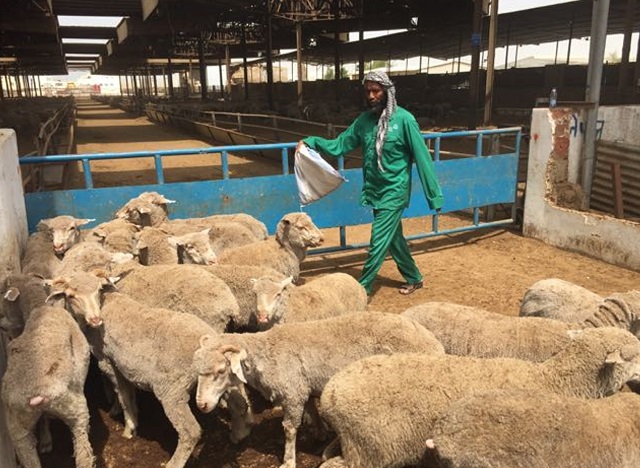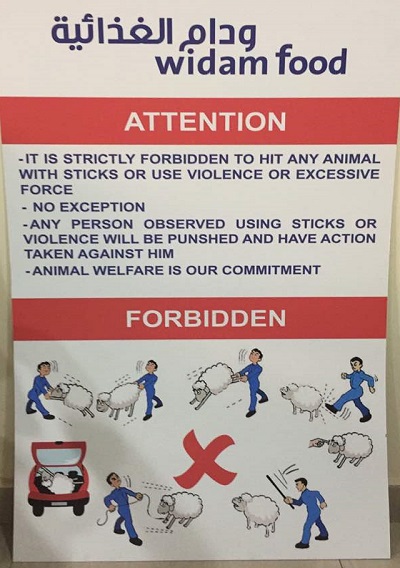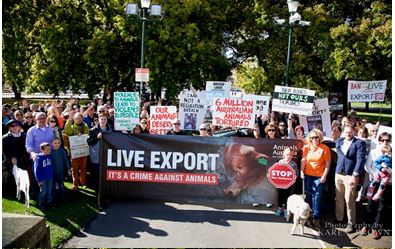[Updated] Call for Footage Taken On Board Maysora to be Made Public
RSPCA Australia has called for the immediate public release of unedited footage of conditions onboard the livestock carrier Maysora last week.
The filming was undertaken by government inspectors in response to whistle-blower footage released on the 60 Minutes program over a week ago showing a voyage where thousands of sheep died of heat stress on the Awassi Express on their way to the Middle East for Emanuel Exports.
RSPCA Australia Chief Scientist and Strategy Officer Dr Bidda Jones said, “Given the industry’s claims of improved transparency, there should be no reason not to release that raw and unedited footage immediately.”
She says that whether or not the Australian public believe the conditions are acceptable should be put to the test - “Remembering this is just the start of the journey, before the overcrowding, heat and humidity cause conditions to deteriorate over the three to four week voyage.”
In response to the whistle-blower footage, the Australian Department of Agriculture and Water Resources also placed a departmental observer on the Maysora - a converted container carrier like the Awassi Express. The RSPCA is also calling for the release of the images, footage and notes being collected daily by the observer to show how conditions change throughout the journey.
The destination for any live sheep from Australia is now also in question, says Jones, after even more footage was released this week showing sheep outside an abattoir in Qatar trying to escape workers who were hitting them with large sticks and picking them up and throwing them around. Qatar is the second largest market for Australian sheep, taking 640,000 head (32.8 percent of exported sheep) – many of which would likely have been sent to the abattoir.
“Once again, this shows why farmers can’t rely on live exports,” said Jones. “Trying to regulate this cruel trade is impossible; there’s always another disaster just around the corner.
“While we’ve seen far too much footage previously of appalling practices in the country of destination, it’s only now that we have proof of how gruesome onboard conditions under Australian standards are. Until now, farmers have had plausible deniability,” she said. “But from this point on, no Australia farmer can say they didn’t know how their animals were ending up. It’s time for farmers to make a moral decision on how they allow the animals they’ve raised to be treated,” she said.
The Next Emanuel Exports Shipment

Qatar handler using feed bag as flapper to move sheep
The call for the release of the footage comes as the Al Messilah arrives in Fremantle. She is the first ship anticipated to load sheep from Emanuel Exports to arrive into the port since the footage of the conditions onboard the Awassi Express was released.
 Emanuel Exports released a statement on Wednesday saying it has taken decisive steps in the past week to uphold welfare standards and further mitigate the risks of exporting sheep to the Arabian Gulf during the Northern Hemisphere summer. Director Nick Daws said Emanuel Exports shares the determination of industry, producers and the federal government that the conditions experienced in Qatar in August 2017 are never repeated. “This tragedy has been heartbreaking for our company, and we apologize to producers and the broader community for the outcome in Qatar in August last year,” Daws said.
Emanuel Exports released a statement on Wednesday saying it has taken decisive steps in the past week to uphold welfare standards and further mitigate the risks of exporting sheep to the Arabian Gulf during the Northern Hemisphere summer. Director Nick Daws said Emanuel Exports shares the determination of industry, producers and the federal government that the conditions experienced in Qatar in August 2017 are never repeated. “This tragedy has been heartbreaking for our company, and we apologize to producers and the broader community for the outcome in Qatar in August last year,” Daws said.
Emanuel’s forthcoming shipments will designate Kuwait as the first discharge port so that a large number of animals will be discharged in conditions where moisture build-up is negligible. Sheep supplied by Emanuel Exports for Gulf consignments will also be loaded at 17.5 percent below the stocking density required by the Australian Standards for the Export of Livestock (ASEL).
Emanuel Exports is also negotiating new arrangements with the importer to ensure shared control of the conditions in which sheep are loaded at the port and transported during the voyages to the Gulf. “The exporter is responsible for welfare, so even if the importer assumes ownership of the sheep upon loading onto the vessel, we need to work more effectively with the importer, our accredited vets and stockpersons to ensure all appropriate animal welfare precautions are in place,” Daws said.
Emanuel Exports has also taken action on the mishandling of sheep in Qatar with the construction of an improved raceway at the facility and further animal handling training. The two facility employees guilty of welfare breaches were removed from the site and reprimanded. The facility remains closed to Australian sheep while an audit is completed.
Awassi Express Yet to Sail

“Over the last 30 years, millions of animals have died on these ships,” she says. “Stocking density is one third of a square meter for a 47-kilogram (104-pound) sheep, so as we saw, the sheep have no possible way to lie down and have to fight to get near feed and water. Those space regulations have not changed since 1983.
“We also saw newborn lambs, and it is a breach of the regulations to load pregnant animals, and we saw sheep clearly still alive being tossed over the side. The throats of the lambs were cut, and they went over the side too.
“A few years ago, decreasing stocking densities was mooted, but opposition from the exporters was so fierce that nothing changed, and this is just one example of how absolutely wrong that was,” says Cass.

that matters most
Get the latest maritime news delivered to your inbox daily.
The Maritime Executive's coverage of the situation to date:
Thousands of Sheep Died and Someone Filmed It
Livestock Exporters Present Plan for Stronger Onboard Safeguards
Australia Blasted Over Livestock Carrier Conditions
U.K. Mulls Live Export Ban
Independent Observer Offered for Live Export Voyages
Live Export Trade Faces a Kangaroo Court
